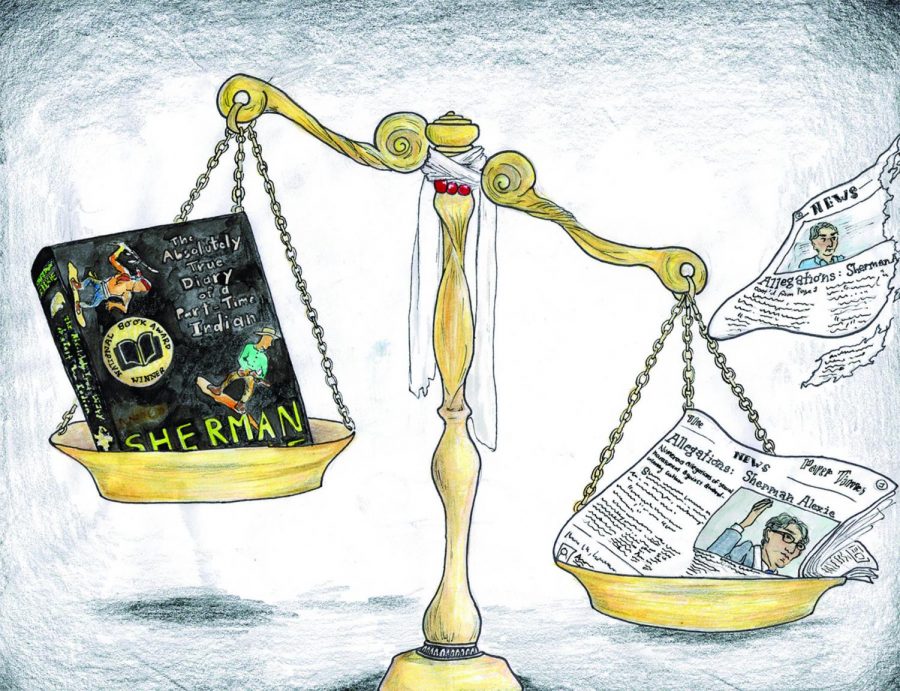Remove Alexie from curriculum
Sexual harassment allegations against Sherman Alexie should outweigh how well the novel works within the curriculum, as students should be able to choose whether to read a text. Graphic by Baeyoung Yoo
A person’s image is an extremely delicate thing.
Three years ago, I looked favorably upon Sherman Alexie, an award-winning author. I avidly discussed his novel, “The Absolutely True Diary of a Part-Time Indian,” in my freshman English class, along with its important themes. But in the spring of 2018, after hearing an NPR segment about sexual harassment allegations from multiple women against Alexie, my image of him came crumbling down.
Earlier that year, Alexie issued a statement apologizing and admitting that he had “harmed other people” and that there are “women telling the truth about [his] behavior.”
In October of 2019, I interviewed Karen Cunningham, the instructional supervisor of the English Department at the time. She said the freshman English classes decided not to teach Alexie’s novel for the 2018-2019 school year — “a reaction to hearing the accusations.”
“It was just frustrating to people, and [teachers] said they weren’t comfortable teaching [Alexie’s novel].
“In the meantime, some of us … were just reading, trying to find a book that we thought would work in its place,” Cunningham said.
Last year, Alexie’s novel returned to the curriculum.
“That book does a really superb job of looking at issues of identity and otherness and fitting in,” Cunningham said.
Without the novel, “we found there was a huge deficit,” said Cunningham. “[The curriculum] didn’t work the way it had the year before because [the novel] was a key link in what we were doing.”
Although I understand its reasoning, I believe the English Department must revisit its decision.
By taking a strong stance against Alexie’s work, we would send the message that our school does not condone sexual harassment.
There are, of course, those who believe the substance and quality of a work of art overshadow an artist’s actions. If we dismissed every artist for the things he or she did, we would lose many incredible paintings, literature and pieces of music.
However, the decision to experience a work of art and disregard the artist’s actions is, and should remain, a personal choice for everyone. I couldn’t force a fan of R. Kelly, a rapper accused of multiple accounts of sexual assault, abuse and child pornography, to stop listening to his music, although I wouldn’t listen to it myself.
And yet, freshmen are compelled to read Alexie’s novel.
According to Cunningham, if a student refuses to read a text, they’ll be given an alternative. But in standing up for their beliefs and choosing not to read Alexie’s novel, freshmen would be taken out of the classroom experience. That sacrifice isn’t one a student should be forced to make when standing up for their morals.
So, it is up to the English Department. Students should be able to make the same decision with Alexie’s novel as they would with any other book whose author has been accused of misconduct: to read, or not to read.
Cunningham said “one of the thoughts was to keep looking” for another text to possibly replace Alexie’s novel. The freshman English team should keep looking and make the switch to another text with similar themes.
It’s been a few years since I first heard about the allegations against Alexie, but I feel the same as when it all started. This discussion shouldn’t fade as years pass with freshmen still reading the novel. The discussion should end only when the freshman English curriculum no longer begins with Sherman Alexie.


